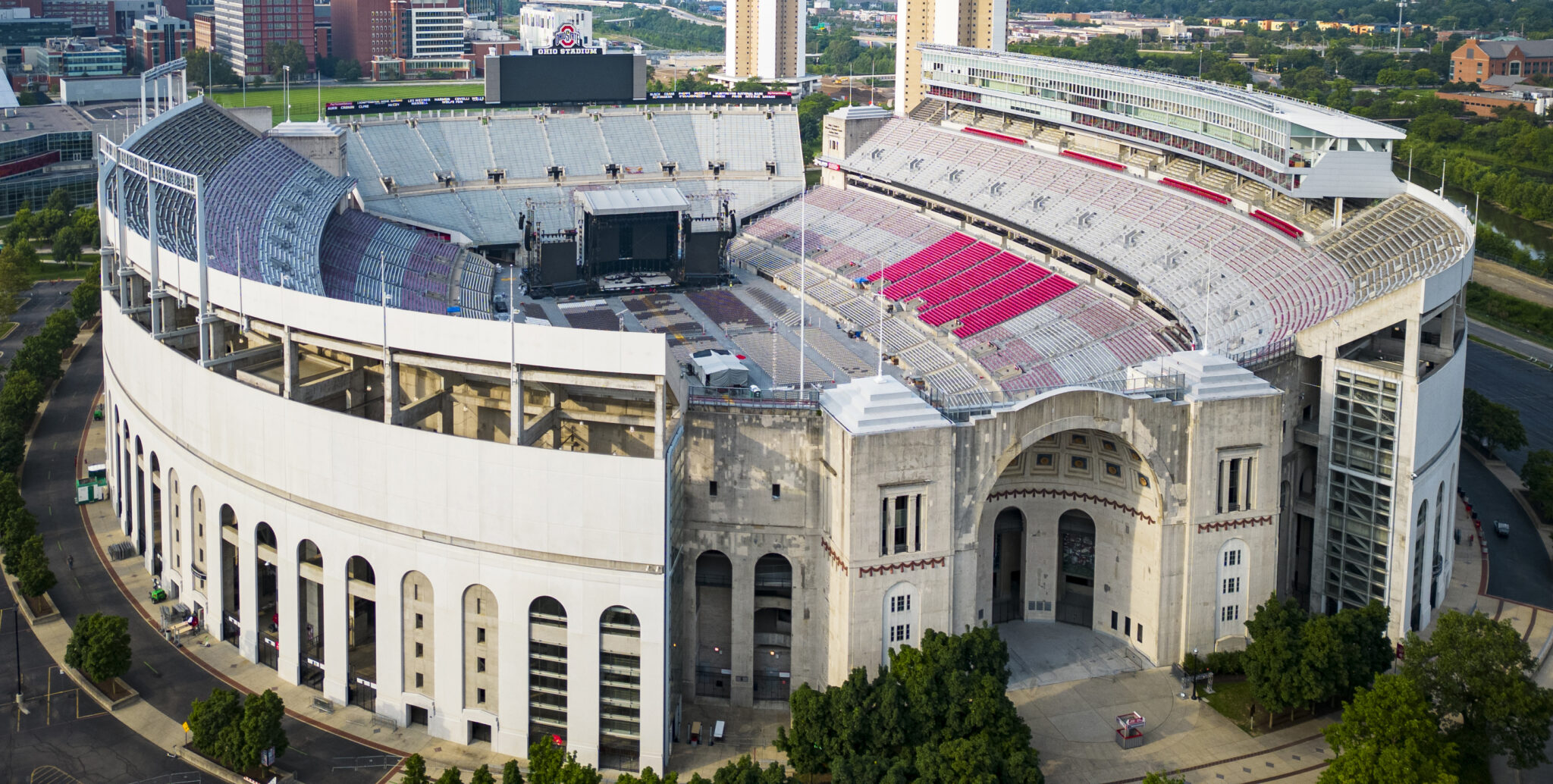Ohio Republican lawmaker wants to ban noon Ohio State football games.
In an unexpected turn of events, an Ohio Republican lawmaker has introduced a proposal aimed at banning noon kickoff times for Ohio State University football games. The move has sparked intense debate among fans, sports analysts, legislators, and local businesses alike. With Ohio State football being a cultural cornerstone in the state, the implications of such a ban are both wide-ranging and complex.
Representative John Harrison (R-Ohio), a relatively new member of the Ohio House of Representatives, has put forth legislation that would prohibit the scheduling of Ohio State Buckeyes football games at noon. Harrison’s rationale centers on a mix of community concerns, public safety, and tradition.
In an official statement, Harrison explained, “Noon kickoff games disrupt family routines, create traffic nightmares, and reduce attendance at local religious services and community events. This legislation is about preserving community cohesion and respecting Ohio traditions.”
The bill proposes that Ohio State football games be scheduled exclusively in the afternoon (1 p.m. or later) or evening time slots. It does not ban noon games for other sports or schools but specifically targets Ohio State football, reflecting the sport’s unique cultural and economic footprint in the state.
Ohio State football is arguably one of the most storied programs in college football history, with a passionate fanbase that stretches far beyond Columbus. Traditionally, Ohio State schedules a mix of kickoff times ranging from noon to evening. Noon games are often favored for their convenience, allowing fans to attend or watch games early in the day, leaving the rest of the day free for other activities.
Historically, noon games have been a staple since the early days of college football, aligning with traditions of Saturday afternoon sports culture. However, in recent decades, scheduling has become more varied due to television contracts, conference obligations, and national broadcasts.
Harrison’s proposal seeks to roll back these trends, pushing for a return to what he frames as more community-friendly timing.
1. Community and Religious Considerations:
One of the primary arguments in favor of the ban revolves around community and religious observance. Noon games often coincide with church services and other family gatherings. Some constituents have expressed frustration that large crowds and traffic congestion around Ohio State home games make attending services difficult or impossible.
Supporters of the bill argue that banning noon games would allow families to maintain these traditional Saturday routines without disruption.
2. Traffic and Public Safety:
Ohio State football games attract tens of thousands of fans, which invariably leads to significant traffic congestion around the stadium and throughout Columbus. Noon games, supporters argue, create peak congestion during the middle of the day when many residents are out running errands, attending appointments, or taking children to activities.
Afternoon or evening games, they say, would better stagger traffic flow and reduce conflicts with other daily activities, enhancing public safety and reducing stress on local infrastructure.
3. Economic Balance:
Local businesses around the Ohio State campus often see huge spikes in patronage on game days, particularly those that cater to fans tailgating or dining out. However, some small businesses and non-sports-related retailers complain that noon games push customer traffic to narrow time windows, disrupting normal operations.
Proponents of the bill suggest that later games would spread out business activity more evenly and encourage fans to stay in the city longer after games rather than rushing out immediately.
1. Tradition and Fan Experience:
Opponents of the proposed ban argue that noon kickoffs are a beloved tradition for Ohio State fans. For many, a noon game is an integral part of the Saturday experience, providing an early start to a day of celebration with friends and family.
Changing kickoff times could alienate fans who prefer earlier games, especially families with young children or older fans who find late evening games less accessible.
2. TV and Revenue Implications:
Television contracts and media rights deals play a huge role in determining game times. Noon games often draw strong regional and national viewership, which translates into significant advertising revenue for the university and the Big Ten Conference.
Banning noon games could reduce Ohio State’s exposure and impact lucrative media contracts, potentially affecting the athletic department’s revenue and funding for other sports programs.
3. Scheduling Challenges:
The college football schedule is complex, involving multiple stakeholders including the university, the Big Ten, broadcasters, and opponents. Forcing Ohio State to eliminate noon games may complicate scheduling logistics and limit the flexibility needed to maximize competitive and commercial opportunities.
Ohio State University Athletics:
Athletic Director Gene Smith responded cautiously to the proposal, emphasizing the importance of balancing tradition, fan experience, and community impact. “We understand the concerns raised, but our scheduling decisions are guided by multiple factors including fan preferences, television contracts, and overall program success,” Smith said.
The Buckeyes’ coaching staff and players have not officially commented, but informal fan surveys suggest mixed opinions, with many fans favoring the flexibility to attend games at various times.
Fans and Community:
The fan community is split. Some longtime fans see the ban as an unnecessary interference with tradition. Others, especially those living near the stadium, express relief at the prospect of reduced midday congestion.
Religious leaders from several local congregations have publicly supported the ban, noting that noon games often conflict with worship times.
Local Businesses:
Local businesses near Ohio Stadium expressed concerns about the impact on foot traffic and sales. Some restaurateurs believe that noon games bring in large crowds early, boosting lunch and tailgate-related sales, while others think later games might encourage more prolonged economic activity into the evening.
The proposal to ban noon Ohio State football games taps into broader cultural debates about how sports fit into community life. It raises questions about:
- The role of sports in public life: Should sports schedules be dictated solely by commercial interests and fan demand, or should community considerations play a greater role?
- Balancing tradition with modern needs: How do changing societal rhythms, such as shifts in work-life balance and urban development, affect longstanding traditions?
- Politics and sports: This proposal highlights how sports, especially college football in football-mad states like Ohio, can become arenas for political debate and policymaking.
Ohio is not alone in wrestling with sports scheduling issues. Other states with prominent college or professional teams have faced similar tensions:
- In Alabama, there have been calls to consider religious observances when scheduling Crimson Tide games.
- In Texas, debates have erupted about high school football game times affecting family routines and safety.
- Some cities with major NFL teams have adjusted kickoff times to reduce traffic congestion and improve public transit use.
Ohio’s potential ban on noon Buckeye games could become a case study in balancing local interests with the demands of big-time college sports.
The proposed legislation is in its early stages and faces an uphill battle. Sports scheduling decisions have traditionally been left to university athletic departments and conferences, not state lawmakers. Additionally, Ohio State’s media contracts add layers of complexity.
However, if the bill gains traction, it could lead to negotiations between state officials, the university, and other stakeholders to find a compromise that addresses community concerns while preserving fan and financial interests.
The proposal by Ohio Republican lawmaker John Harrison to ban noon Ohio State football games is a surprising development that shines a spotlight on the intersection of sports, community, and politics. While the idea has strong support among some community groups and religious leaders, it faces resistance from fans, media partners, and the university itself.
Ultimately, the debate underscores how deeply embedded college football is in Ohio’s culture and how scheduling decisions resonate far beyond the field. Whether the proposal becomes law or sparks a broader dialogue about the place of sports in public life, it has already revealed how even kickoff times can become a symbol of larger societal values and tensions.



